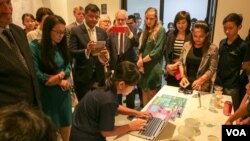Not enough young Cambodians are interested in science, technology, engineering and math.
That is the view of Education Minister Hang Chuon Naron, who attended last week an event where four young Cambodians showed off the results of their research: innovations in water distillation; video game creation and the health impact of processed drinks.
Only 3 percent of students choose to study the so-called STEM subjects at university, according to the ministry, while almost half choose management degrees.
However, Naron says there are signs that this imbalance is changing.
At the event, which launched the STEM HUB and a magazine aimed at young people interested in gaining technical skills, Young Scientists, he said he hoped it would “encourage our youth to study science subjects.”
He said that more students are opting for the sciences, which provided essential skills needed for development in the modern world, adding that universities had seen a 40 to 50 percent increase in students applying for STEM subjects compared with three years ago.
The STEM HUB will serve as a center for events where Cambodians can share successful projects they have worked on with their peers.
It will also be accompanied by an educational program supported by the UK Embassy.
Bill Longhurst, UK ambassador, said he hoped more Cambodians would be encouraged to take up science subjects.
“[O]ur aim is to try to inspire the next generation of Cambodians to consider taking STEM education subjects. To do that we've done a number of things. We introduced a new maths teaching method to teaching in Cambodia,” he said.
He added that the embassy had also put in place ‘STEM ambassadors’ who would travel the nation and meet with students at high schools.
Li Nilroth, 14, a science student, said the work was difficult but he had good teachers, which made it easier.
“For me, personally, it's not that difficult. It's just that at first I don't know English. Hence, I just need to try harder,” he said.
Research shows that countries that have a high number of STEM graduates have a knock-on effect on the economy, boosting investment and modernization.
We Need More Science, Math Graduates: Education Minister
- Hul Reaksmey
- VOA Khmer

Only 3 percent of students choose to study the so-called STEM subjects at university, according to the ministry, while almost half choose management degrees.
PHNOM PENH —





